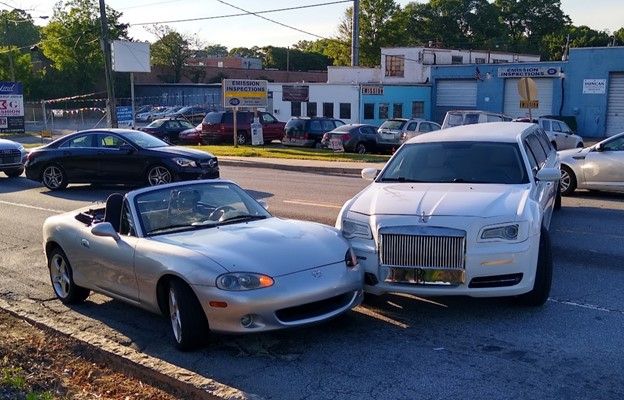Have you ever crashed into a limousine?
I have.

Thankfully, I saw him in time to brake so nobody was hurt. And since the limo was empty except for the driver, nobody missed their prom, either.
The driver and I had a cordial chat, he was cited, and his insurance company paid up. And aside from a good story, the whole episode gave me an odd and surprising appreciation for auto insurance.
Because even in a simple fender bender, without auto insurance, the whole scenario could’ve gotten a whole lot uglier.
So why do we need car insurance? Why do states mandate it? (And is it worth paying for it in the two states where it isn’t required?) How does auto insurance protect our house and, yes, even our relationships, and why should we be glad to buy it?
Whether you’re doubting the need for your policy renewal or are simply curious, let’s investigate 7 reasons why you need car insurance.
1. It’s required by law (in all but two states)
The #1 reason why you need car insurance is because, well, you have to have it. If you get busted without a car insurance policy, you could be looking at a big fat fine — or even jail time.
In Georgia, for example, here are the penalties under state law for driving without car insurance, according to Car & Driver:
- First time: 60-day suspension of your license and vehicle registration, and depending on the circumstances of why you were pulled over, up to 12 months in jail.
- Second time: 90-day suspension of your license and vehicle registration, an $85 fine, and a higher likelihood that the judge will send you to the clink.
- Subsequent times: Same punishment as the second offense, plus an even higher likelihood you’ll go to jail and have your driver’s license permanently suspended in Georgia.
Yeah, law enforcement isn’t very forgiving of the uninsured motorist.
It’s worth mentioning, too, that the government won’t un-suspend your license until you show proof of insurance coverage — and buying insurance on a suspended license is crazy expensive. SR-22 insurance, as it’s known, can cost anywhere from 150% to 400% of a regular policy.
Letting the insurance companies gouge you for SR-22 car insurance coverage is the “hidden fee” of driving uninsured, and can cost you $10,000+ in extra premiums until your points expire.
Not worth it!
Two states where driving uninsured is… legal?
There are actually two U.S. states where you can legally drive without insurance.
- Virginia lets you skip out on the state minimums if you either a) pay a $500 Uninsured Motorist Fee each time you renew your vehicle registration, or b) post cash bond, i.e., a big pile of cash to prove you can pay out-of-pocket for an accident.
- New Hampshire also doesn’t require you to carry auto insurance if you can “demonstrate that you are able to provide sufficient funds” to cover the costs of an at-fault accident, according to NH.gov. Thankfully, very few people have opted for the twisted logic of saying they’re “too rich to pay for insurance” — New Hampshire has one of the lowest rates of uninsured drivers in the USA at just 6.1%.
Even if you live in these states, you’ll definitely still want car insurance for the rest of the following reasons.
2. To compensate someone else for an accident you caused
The government mandates car insurance for the same reason it mandates seat belts; both devices protect us from catastrophic scenarios.
Let’s say you get into a car accident. You tried to pull out of Chipotle during rush hour but you didn’t see a car speeding in the right-hand lane, so they crash into you. It’s an honest mistake, and it happens every day.
Both cars are smashed and the other driver and her passenger have neck injuries. In a world without car insurance, the other driver and her passenger could sue you for 100% of their medical expenses, loss of use, motor vehicle damage, and more. You’ll be lucky if your total bill comes to less than $100,000.
That’s one expensive burrito — and we haven’t even factored in the costs to fix or replace your own car.
It’s important to point out that in a scenario where an uninsured driver causes an accident, everyone gets screwed — not just the uninsured driver.
- The accident victim can’t access the funds they need so their debt with interest piles up (and pulverizes their credit score).
- The at-fault driver has to wait for the financial axe to fall when personal injury law gets involved and some ambulance chaser multiplies their victim’s entitled compensation (and their commission).
- The government has to dedicate courtroom time, public attorneys, and tax dollars to the inevitable nasty legal battle between the drivers. They, too, have to pay out-of-pocket for damage to public property such as fences and guardrails.
The only winners in an uninsured accident are the lawyers. Everyone else is out tens, if not hundreds of thousands of dollars — and at least one person’s life is basically over.
The tragedy is that this entire situation could’ve been avoided if the uninsured driver had just paid $1,000 for a 50/100/50 insurance policy ($50,000 bodily injury per person, $100,000 bodily injury per accident, $50,000 property damage liability).
That’s why governments mandate insurance.
3. To compensate you for an accident caused by someone else
On the flipside, when you’re hit by someone else, you’ll be glad the government required them to have insurance.
Because if you’re hit by an uninsured driver, it may take you a long, long time to get the money you’re entitled to. In the meantime, you’re footing the bills for repairs, medical payments, and more — with both your credit score and your sanity on the line.
That’s why they call it liability coverage. The other driver is *liable* for damage to your car (property liability coverage) and your medical bills (bodily injury liability coverage).
That’s also why governments don’t mandate collision or comprehensive insurance; to be blunt, they don’t really give a hoot if you damage your own stuff. They just want to be sure you can cover someone else’s bills (including theirs).
Even so, you might want to get collision and comprehensive coverage for reason #4!
4. To get your car fixed — no matter who caused the accident
Every driver needs liability insurance, but only some need collision and comprehensive insurance.
- Collision insurance helps to cover the cost of repairing/replacing your car if you cause an accident or if the other driver’s insurance doesn’t cover the cost of your repairs (or doesn’t exist at all).
- Comprehensive insurance covers damage to your car as a result of an “incident” such as vandalism, theft, floods, falling trees, rogue deer, alien invasion, etc.
Now, do you *need* collision and comprehensive insurance yourself?
It all depends on your response to a simple question: if your car were seriously damaged tomorrow, could you pay out-of-pocket for repairs — or even a replacement?
If not, paying for collision and comprehensive insurance upfront can bring peace of mind and prevent a big financial burden. That’s especially true if you depend on your car for your personal health or income.
If your car isn’t worth that much and you have a few grand to spare for potential repairs (or even a replacement), you can safely pass on collision and comprehensive coverage.
Finally, if you couldn’t pay out-of-pocket to repair/replace your car, but you could live without it for a while, you might also be OK without collision and comprehensive. They’re not cheap, after all, and the pair can easily add ~$500+ to a six-month premium.
Oh, and one last thing: collision coverage is also a good idea for your rental car. Thankfully, your rewards card might include it for free. Check your cardholder benefits for “Auto Collision Damage Liability Waiver” or something similarly worded.
5. To protect your assets
Let’s say you cause a $50,000 accident but only have $5,000 in your bank account. The other driver’s lawyers can legally seize additional assets in your name to cover what you owe.
That can include your investments, your car, and even your house.
Yep; you can lose your house in a fender bender.
Remember, liability insurance doesn’t protect you; it protects your net worth. It creates a “buffer zone” between the victim’s entitled compensation and all of your stuff.
That’s why when you buy a home, you should increase your auto insurance liability limits. 50/100/50 is a much wider buffer zone to protect your home equity.
6. To help cover your passengers
If you’re found to be at fault for an accident, you’re liable for your passengers’ bills, too.
That can include both property damage and medical expenses. Say, for instance, you’re driving a friend to a photo shoot, and they have tons of expensive camera equipment in the trunk. You cause an accident, they get injured, and their stuff gets destroyed.
You’re liable for their medical bills and replacing their fancy equipment.
At this point, would you rather say:
“Don’t worry, I have insurance.”
Or
“I’m sorry, man, I have no idea when I’ll be able to pay you back.”
It may sound melodramatic, but it’s objectively true: auto insurance coverage protects friendships!
7. It brings peace of mind to everyone
The final reason you need car insurance is that it brings peace of mind to everyone.
How would you feel knowing that every time you left the house, you could be hit by another driver and get stuck with $136,261 worth of bills until the other driver pays you back?
I’d be scared to leave the house, TBH. I’d sell my cars and start saving for a helicopter.
I much prefer a system where everyone must have insurance, especially with so many mindless drivers on the road these days. An auto insurance policy doesn’t make them better drivers, but it does ensure that you don’t get victimized by their negligence.
Conclusion
Insurance may feel like kind of a scam sometimes, but it really does keep the wheels of society turning. It cultivates peace of mind, protects livelihoods, and keeps our courtrooms clear.
While you’re here, if you’re looking for a better insurance quote, check out The best car insurance companies for young adults.


